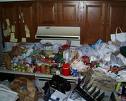Are You a Compulsive Hoarder?
What is a compulsive hoarder?
This may be a somewhat sensitive and heavy topic, but I believe many will find great value in it.
Disclaimer: I am not a medical or mental health professional. The information here has been compiled from various sources on the topic. I am not prescribing any diagnosis or treatment.
Here goes!

We all collect items during our lifetime. Coins, dolls, books, stamps, shoes, trinkets, you name it. But what we’re talking about here is not mom or grandma’s salt and pepper collection that’s run amok (so don’t go running to your mom or grandma and start accusing them of hoarding)!
Sometimes collecting can get out of hand, but that’s not what we’re talking about here. Hoarding is not collecting.
Definition of Hoarding
Webster’s Dictionary defines a hoard as: Hidden accumulation (note use of the word hidden).
Other sources define hoarding as: Excessive collection and retention of items to the point it interferes with daily functioning (home, health, family, work, social life, etc.).
Hoarding: General Information
Let me be clear . . . This is MUCH more than just having a messy house, normal clutter or being very disorganized. This is a genuine compulsion.
Compulsive hoarding is sometimes referred to as pathological hoarding.
Many people who hoard are also compulsive buyers as well.

Researchers indicate that hoarding seems to be pretty evenly divided between men and women. Statistics show that there are slightly more women hoarders that are known than men. Maybe men just hide it better?
One study found that 80 percent of hoarders grew up in homes as children with someone who hoarded. Many are children of parents who grew up during the Great Depression. They learned not to waste anything. Everything might be needed later on.
Not all researchers agree on whether compulsive hoarding is a condition in and of itself or if it is simply a symptom of other related conditions such as Obsessive Compulsive Disorder (OCD) and/or Obsessive Compulsive Personality Disorder (OCPD).
Extreme cases even cause both safety and health hazards. In some cases, people cannot get rid of actual trash, garbage, leftover food, etc.
This causes problems:
- Due to rodents and insects being attracted to the food and garbage
- Piles of old clothes, magazines, newspapers, etc. become a fire hazard
- Often firefighters, ambulance and other emergency personnel cannot find their way through the piles to assist the person
There are even categories of hoarding:
- Book hoarding (Bibliomania) is an obsessive-compulsive disorder involving the collecting or hoarding of books to the point where social relations or health are damaged.
- Animal hoarding involves keeping higher than usual numbers of animals as pets without having the ability to properly house or care for them, while at the same time denying this inability.
The truly sad part is these people are suffering and so are the ones who love them.

Compulsive Hoarding:
A Few Reasons People Hoard
The following reasons of why people hoard are closely linked. Although they appear to be somewhat similar, they still have distinct differences.
These are only a few reasons why people hoard.
- Sentimental Value: Sentimental value is one of the criteria that most of us keep anything. The value is subjective. The item feels as if it has become a part of you or a loved one. It’s not just an object. This is typical among the elderly who are lonely after the children are gone and a spouse has died. Common misconception: If I discard it, I’m discarding a part of myself or someone I love.
- Difficulty Making Decisions: Not having to decide about discarding something means you can’t make a mistake. It’s the thought process that: “I can’t go wrong if I don’t make a choice.” By thinking this way, the person never has to face the: "What if I may need this someday?” Common misconception: If I decide to throw something away, I might be making the wrong choice.
- Responsibility: Unlike procrastination, hoarders tend to feel hyper-responsible for everything and everyone around them. They accumulate items just in case someone might need it. Common misconception: If I see that an object has a use, I must keep it for future use so it doesn't get wasted.

Cures and Treatments
There is no cure for compulsive hoarding. There is no treatment that will make the problem go away completely and never return.
However, some doctors have helped people manage their symptoms effectively in the following ways:
- Medications: Use of antidepressants that increase serotonin levels in the brain. However, some people with compulsive hoarding don’t respond as well to these medicines as people with other kinds of obsessive-compulsive symptoms.
- Cognitive-behavioral therapy: This is a form of counseling that goes beyond talking. The therapist usually visits the person's home and works with them on learning to make decisions and think clearly about their possessions.

If you or Someone You
Know Needs Help
Compulsive hoarders usually have taken their internal emotional clutter and have given it an external manifestation.
The reason they surround themselves with things is to try to fill a void. They may also seek to surround themselves with a bubble of security and comfort.
Clutter and disorganization cause stress not only for the cluttered person, but family, friends, and co-workers as well.
There is no need to be embarrassed. Hoarding is typically a life-long psychological problem that can’t be solved overnight.
The best advice anyone can give someone suffering from compulsive hoarding is:
The following is a link to My Mother's Garden a film about one woman's struggle with compulsive hoarding. Read about the film and view the trailer.
Additional Things to Consider
The National Association of Professional Organizers (NAPO) has a special group of Professional Organizers trained to deal with compulsive hoarding.
The National Study Group on Chronic Disorganization also offers a certification program for dealing with chronic disorganization issues, such as hoarding.
Additional Resources
You can find additional information and resources on compulsive hoarding (and related material on OCD and OCPD) and treatment at various websites.
You might also want to read the book by Fugen Neziroglu entitled Overcoming Compulsive Hoarding: Why You Save & How You Can Stop.
Find more helpful information on this website under Start Here.
Click the lavender bar on the left and subscribe to the RSS feed to be notified of new listings as they become available.
Did you like this? Please share it! Thanks in advance.
No matter where you are in life (stay-at-home mom, full or part time employee, retired, etc.) you can make a good income with a website. Whether you write books, make crafts or something else, I highly recommend SBI. It's the reason for this website. Check it out below and become another solopreneur!
Hello! This is Shelly Morton, the author of this website. I know you hear a lot of hype about making money from home and building a successful website. I speak from experience as a solopreneur, I have succeeded with Solo Build It! There is simply no better way to build an online business. Nothing else compares. It's not a "get rich quick" scheme. SBI provides you with all the tools and tips you need to be successful. You put in the work and SBI will help you succeed! SBI is simply the BEST way to get started for any "solopreneur."




